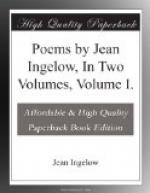O the silence that came next, the patience and long
aching!
They never said so much as “He was
a dear loved son;”
Not the father to the mother moaned, that dreary stillness
breaking:
“Ah! wherefore did he leave us so—this,
our only one.”
They sat within, as waiting, until the neighbors prayed
them,
At Cromer, by the sea-coast, ’twere
peace and change to be;
And to Cromer, in their patience, or that urgency
affrayed them,
Or because the tidings tarried, they came,
and took me.
It was three months and over since the dear lad had
started:
On the green downs at Cromer I sat to
see the view;
On an open space of herbage, where the ling and fern
had parted,
Betwixt the tall white lighthouse towers,
the old and the new.
Below me lay the wide sea, the scarlet sun was stooping,
And he dyed the waste water, as with a
scarlet dye;
And he dyed the lighthouse towers; every bird with
white wing swooping
Took his colors, and the cliffs did, and
the yawning sky.
Over grass came that strange flush, and over ling
and heather,
Over flocks of sheep and lambs, and over
Cromer town;
And each filmy cloudlet crossing drifted like a scarlet
feather
Torn from the folded wings of clouds,
while he settled down.
When I looked, I dared not sigh:—In the
light of God’s splendor,
With His daily blue and gold, who am I?
what am I?
But that passion and outpouring seemed an awful sign
and tender,
Like the blood of the Redeemer, shown
on earth and sky.
O for comfort, O the waste of a long doubt and trouble!
On that sultry August eve trouble had
made me meek;
I was tired of my sorrow—O so faint, for
it was double
In the weight of its oppression, that
I could not speak!
And a little comfort grew, while the dimmed eyes were
feeding,
And the dull ears with murmur of water
satisfied;
But a dream came slowly nigh me, all my thoughts and
fancy leading
Across the bounds of waking life to the
other side.
And I dreamt that I looked out, to the waste waters
turning,
And saw the flakes of scarlet from wave
to wave tossed on;
And the scarlet mix with azure, where a heap of gold
lay burning
On the clear remote sea reaches; for the
sun was gone.
Then I thought a far-off shout dropped across the
still water—
A question as I took it, for soon an answer
came
From the tall white ruined lighthouse: “If
it be the old man’s daughter
That we wot of,” ran the answer,
“what then—who’s to blame?”
I looked up at the lighthouse all roofless and storm-broken:
A great white bird sat on it, with neck
stretched out to sea;
Unto somewhat which was sailing in a skiff the bird
had spoken,
And a trembling seized my spirit, for
they talked of me.
I was the old man’s daughter, the bird went
on to name him;
“He loved to count the starlings
as he sat in the sun;
Long ago he served with Nelson, and his story did
not shame him:
Ay, the old man was a good man—and
his work was done.”




